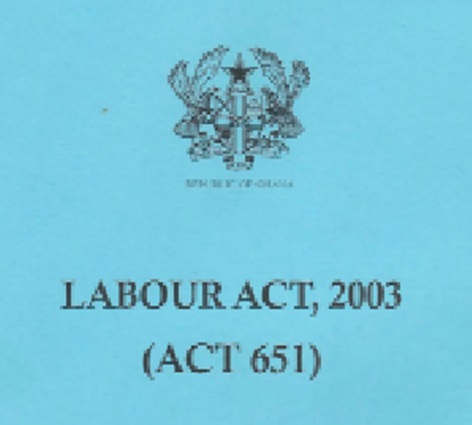
Navigating labour law's ambiguity on leave for miscarriage, stillbirth
In addition to providing women with a 12-week maternity leave period to nurture their newborns and recover after delivery, the Ghana Labour Law (Labour Act 2003, Act 651), specifically Article 57, clause 3, also addresses scenarios where women undergoes Caesarean Section (CS) or gives birth to multiple babies.
It stipulates that, "Maternity leave can be extended by a minimum of two extra weeks in cases of abnormal confinement or when two or more babies are born during the same confinement."
However, the law remains silent on the situation of women who unfortunately lose their babies during pregnancy or delivery.
Forms
Pregnancy loss can occur in two primary forms: miscarriage or stillbirth.
In Ghana, pregnancies lost before 28 weeks are classified as spontaneous abortions, while losses after 28 weeks are termed Intra-Uterine Foetal Demise (IUFD).
The loss of pregnancy or babies can profoundly impact expecting mothers, both emotionally and physically.
The absence of specific provisions in the Ghana Labour Law to address or offer support for women grappling with the loss of pregnancy or babies is a big challenge.
This underscores the pressing need to initiate conversations and consider potential reforms that extend compassionate support to women during their times of vulnerability.
Amid the heart-wrenching scenario of a woman giving birth and subsequently losing her baby, there has been concerns about her entitlement to maternity leave days.
This issue has sparked debates that delve into the fundamental purpose of maternity leaves, questioning whether they are tied exclusively to the presence of a baby and not necessarily to the mother.
While some argue that the absence of a living baby negates the need for the statutory maternity leave, others assert that the act of childbirth alone warrants the full duration of maternity leave for mourning and healing, regardless of the baby's survival duration.
Global perspective
In Canada, labour laws fall under shared jurisdiction.
Federally regulated employees are subject to federal labour laws, while each province has its own labour standards.
In Alberta, if pregnancy loss occurs within 16 weeks of the estimated due date, the woman is still entitled to maternity leave.
In January, 2023, the Maternity leave - IPG-017 was revised in Canada to clarify who is entitled to maternity leave.
It states that, “There is a need to clarify that female employees are entitled to 17 weeks of leave under section 206 if they are: undergoing a miscarriage, undergoing abortion, or delivering a stillborn child.” (https://www.canada.ca/en/employment-social-development/programs/laws-regulations/labour/interpretations-policies/maternity-leave.html).
In the United Kingdom, certain provisions exist for women who go through stillbirths, but similar considerations are not typically extended to those who experience miscarriages.
A woman who losses a baby after 24 weeks of pregnancy is considered a stillbirth, and may be entitled to maternity leave and pay.
This is because, in the UK, a stillbirth is legally considered a birth.
Generally, the UK labour law does not mandate any maternity leave or pay for women who miscarry, that is, before the 24th week of pregnancy.
Employees may, however, be entitled to compassionate or sick leave if they need time off due to physical or emotional health issues related to the miscarriage.
Psychological help
Yaa, an office assistant, lost her baby at six months.
She indicated that she felt somewhat uneasy as her colleagues looked upon her with a sense of sympathy.
The emotions she felt were complex, and the empathy from her colleagues, though well-intentioned, served as a constant reminder of her loss.
This opens up a significant conversation surrounding the need for greater understanding, empathy and supportive work environments for women in such circumstances.
Some medical practitioners fail to inquire about the mental health of these women and as a result, neglect the need to recommend them to psychologists for assistance.
In an encouraging development, certain institutions have proactively introduced psychological support services for all staff and by extension, women who experience miscarriage or stillbirth get to benefit from it.
Bank of Africa for example has taken significant steps by offering access to a clinical psychologist for its staff, without the need to notify HR in advance.
This initiative ensures that employees have a confidential avenue to seek the essential psychological assistance they may require during distressing times.
Recommendation
Organisations could explore the implementation of a hybrid work system, providing women with the flexibility to work conveniently from home.
Women, for their part, should ensure efficiency in their work roles and avoid any potential exploitation of these situations.
In recent times, there have been discussions surrounding the need to extend maternity leave to six months.
It is crucial to incorporate various dynamics related to women and childbirth and conversations about paternity leave into this discourse.
To address these issues effectively, it is imperative for key stakeholders such as the Ministry of Employment and Labour Relations, The National Labour Commission, the Ghana Medical Association, and other relevant stakeholders to collaborate on amending the Ghana Labour law.
This amendment would render these considerations legally binding rather than subjecting them to the discretion of individual institutions.
The writer is a communications officer,
Bank of Africa.
E-mail:
